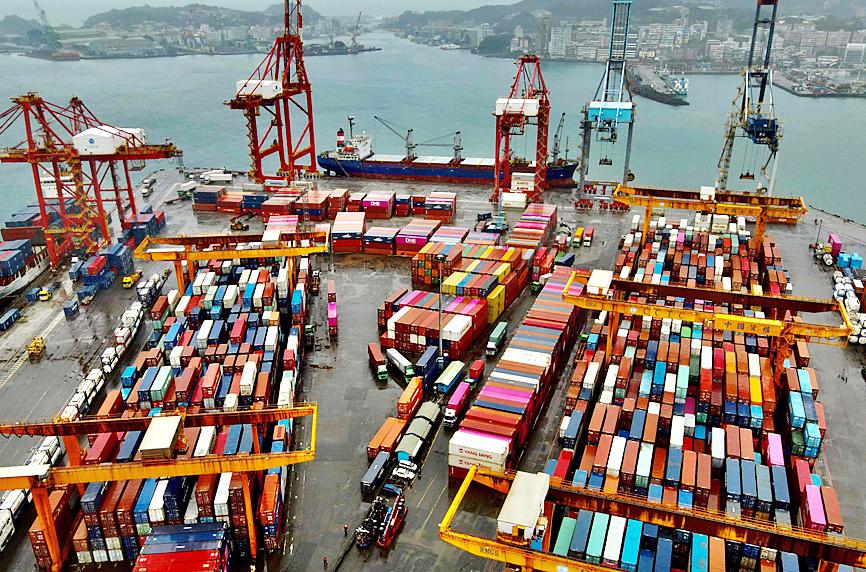The government’s business climate monitor last month signaled “green” for the fourth straight month as the nation’s economic recovery held firm, thanks to robust demand for both tech and non-tech products, the National Development Council said yesterday.
The gauge gained two points to 30, the highest in nine-and-a-half years, and was set to climb higher this month, the council said.
“The latest data suggest that the recovery is not only stable, but will gain further traction,” council research director Wu Ming-huei (吳明蕙) told a media briefing in Taipei.

Photo: Sam Yeh, AFP
The council uses a five-color system to portray the nation’s economic state, with “green” indicating steady growth, “red” suggesting overheating and “blue” signaling a recession. Dual colors mean it is in transition.
The gauge is only two points away from the boom values of 32 to 37, aided by better manufacturing, restaurant and retail sales, the council said.
The remaining constituents stayed in a healthy zone.
Wu said that the monitor might signal “yellow-red” this month, as there is cause for pessimism, based on the trends of all economic bellwethers.
Demand for 5G wireless communication and new technology applications remained strong, while non-tech products showed signs of rebounding, explaining why most sectors reported an upturn in business, Wu said.
The annual “Singles’ Day” shopping season that culminated on Nov. 11 helped boost retail sales in Taiwan, she said.
The index of leading indicators, which aims to forecast the economic situation for the next six months, increased 1.41 percent to 107.45, as all sub-indices registered positive cyclical movements, the report said.
That suggests that recovery is broad-based, rather than being limited to tech sectors as previously, Wu said.
The index of coincident indicators, which reflects the current economic state, gained 1.16 percent to 104.21, also drawing support from all sub-indices, the report showed.
Despite the improvement, the COVID-19 pandemic would continue to pose uncertainty for the global economy next year, Wu said.
If the pandemic escalates in Europe and the US, Taiwan cannot stay immune given its heavy dependence on exports, she added.
Separately yesterday, the council set its economic growth target for Taiwan next year at 3.8 percent to 4.2 percent, driven mainly by growth in external demand, private consumption and domestic investment.
The high end of the council’s growth target is just more than the 3.83 percent the Directorate-General of Budget, Accounting and Statistics forecast on Nov. 27.
The council also expects the nation’s GDP per capita next year to be between US$30,038 and US$30,145, the consumer price index to rise by 1 to 1.5 percent and the unemployment rate to be 3.6 to 3.8 percent, according to a statement on its Web site.

TAKING STOCK: A Taiwanese cookware firm in Vietnam urged customers to assess inventory or place orders early so shipments can reach the US while tariffs are paused Taiwanese businesses in Vietnam are exploring alternatives after the White House imposed a 46 percent import duty on Vietnamese goods, following US President Donald Trump’s announcement of “reciprocal” tariffs on the US’ trading partners. Lo Shih-liang (羅世良), chairman of Brico Industry Co (裕茂工業), a Taiwanese company that manufactures cast iron cookware and stove components in Vietnam, said that more than 40 percent of his business was tied to the US market, describing the constant US policy shifts as an emotional roller coaster. “I work during the day and stay up all night watching the news. I’ve been following US news until 3am

UNCERTAINTY: Innolux activated a stringent supply chain management mechanism, as it did during the COVID-19 pandemic, to ensure optimal inventory levels for customers Flat-panel display makers AUO Corp (友達) and Innolux Corp (群創) yesterday said that about 12 to 20 percent of their display business is at risk of potential US tariffs and that they would relocate production or shipment destinations to mitigate the levies’ effects. US tariffs would have a direct impact of US$200 million on AUO’s revenue, company chairman Paul Peng (彭雙浪) told reporters on the sidelines of the Touch Taiwan trade show in Taipei yesterday. That would make up about 12 percent of the company’s overall revenue. To cope with the tariff uncertainty, AUO plans to allocate its production to manufacturing facilities in

Six years ago, LVMH’s billionaire CEO Bernard Arnault and US President Donald Trump cut the blue ribbon on a factory in rural Texas that would make designer handbags for Louis Vuitton, one of the world’s best-known luxury brands. However, since the high-profile opening, the factory has faced a host of problems limiting production, 11 former Louis Vuitton employees said. The site has consistently ranked among the worst-performing for Louis Vuitton globally, “significantly” underperforming other facilities, said three former Louis Vuitton workers and a senior industry source, who cited internal rankings shared with staff. The plant’s problems — which have not

COLLABORATION: Given Taiwan’s key position in global supply chains, the US firm is discussing strategies with local partners and clients to deal with global uncertainties Advanced Micro Devices Inc (AMD) yesterday said it is meeting with local ecosystem partners, including Taiwan Semiconductor Manufacturing Co (TSMC, 台積電), to discuss strategies, including long-term manufacturing, to navigate uncertainties such as US tariffs, as Taiwan occupies an important position in global supply chains. AMD chief executive officer Lisa Su (蘇姿丰) told reporters that Taiwan is an important part of the chip designer’s ecosystem and she is discussing with partners and customers in Taiwan to forge strong collaborations on different areas during this critical period. AMD has just become the first artificial-intelligence (AI) server chip customer of TSMC to utilize its advanced